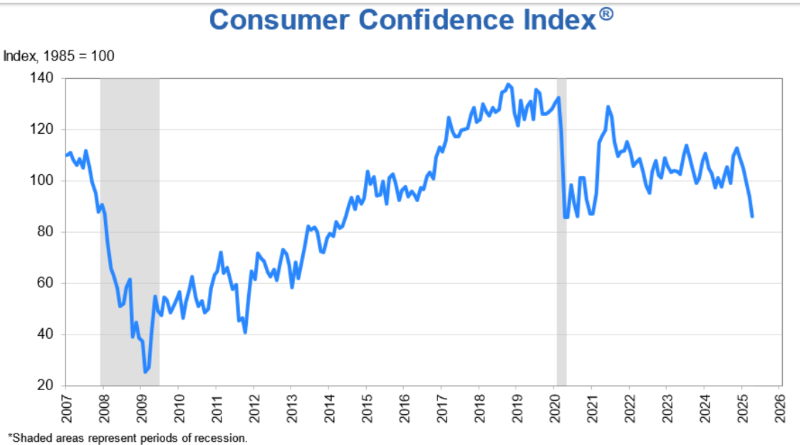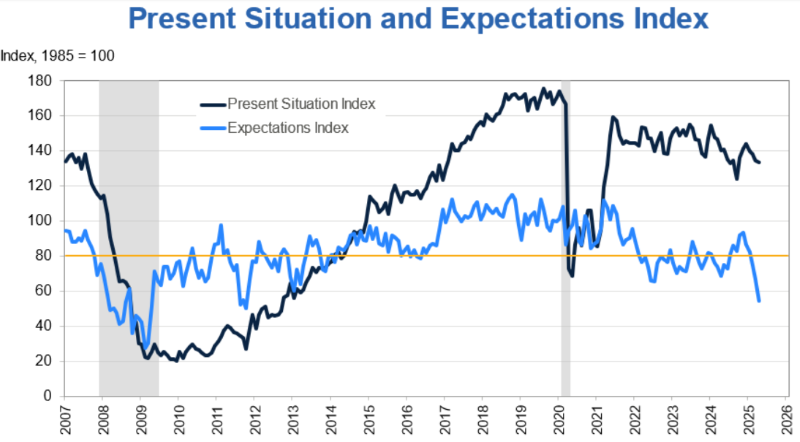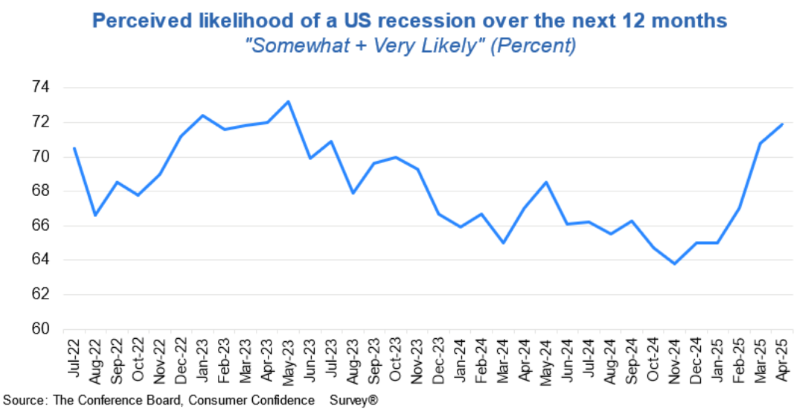Tariffs remain a top concern as do concerns over stock prices and overall uncertainty about the economy
HIGH POINT — Consumer confidence declined for a fifth straight month in April, falling to levels not seen since the start of Covid, driven by mostly by consumer concerns regarding Trump administration tariffs.
The Conference Board reported that the Consumer Confidence Index fell by 7.9 points to 86, while the Present Situation Index fell by .9 points to 133.5. Meanwhile, the Expectations Index dropped 12.5 points to 54.4, the lowest level since October 2011.

The Present Situation Index is based on consumers’ assessment of current business and labor market conditions, and the Expectations Index is based on consumers’ short-term outlook for income, business and labor market conditions.
The decline in consumer confidence, which was across the political spectrum, was also across all age groups and most income groups, the Conference Board said. It was also the highest among consumers between ages 35 and 55 and consumers in households earning more than $125,000 a year.

Based on write-in responses on what issues are affecting consumer views of the economy, tariffs were top of mind, and mentions of tariffs reached an all-time high. It noted that consumers specifically mentioned “concerns about tariffs increasing prices and having negative impacts on the economy.”
“The decline was largely driven by consumers’ expectations,” said Stephanie Guichard, senior economist, Global Indicators at The Conference Board. “The three expectation components — business conditions, employment prospects and future income — all deteriorated sharply, reflecting pervasive pessimism about the future.
“Notably, the share of consumers expecting fewer jobs in the next six months (32.1%) was nearly as high as in April 2009, in the middle of the Great Recession. In addition, expectations about future income prospects turned clearly negative for the first time in five years, suggesting that concerns about the economy have now spread to consumers worrying about their own personal situations. However, consumers’ views of the present have held up, containing the overall decline in the index.”
On a related note, inflation and high prices also impacted their views of the economy, while a majority of those survey voiced concerns about the high cost of living, although there were some references to declines in gas and some food prices. Consumers also voiced concerns over stock prices and overall economic uncertainty.
The proportion of consumers anticipating a recession over the next 12 months rose to a two-year high, and the number of consumers expecting higher interest rates over the next 12 months rose, while the number of consumers expecting lower interest rates declined further.

“High financial market volatility in April pushed consumers’ views about the stock market deeper into negative territory, with 48.5% expecting stock prices to decline over the next 12 months (the highest share since October 2011),” Guichard said, adding, “Meanwhile, average 12-month inflation expectations reached 7% in April — the highest since November 2022, when the U.S. was experiencing extremely high inflation.”
Other takeaways from the survey were as follows:
+ On a six-month moving average basis, purchasing plans for homes and cars declined, as did vacation spending.
+ Plans to buy big-ticket items such as appliances and electronics declined in April but were mostly up on a six-month moving average basis.
+ Consumers’ overall intentions to purchase more services in the months ahead were down, “with almost all services categories affected.”
+ Dining out topped the list of spending plans, but the share of consumers planning to spend more on dining out in the months ahead had one of the largest month-on-month declines on record in April, the Conference Board said.
Of their Present Situation, consumers’ assessments of current business conditions were more positive in April as:
+ 19.2% of consumers said business conditions were “good,” up from 18.3% in March.
+ 16.1% said business conditions were “bad,” down from 16.5%.
Meanwhile, consumers’ views of the labor market weakened in April as:
+ 31.7% of consumers said jobs were “plentiful,” down from 33.6% in March.
+ 16.6% of consumers said jobs were “hard to get,” up from 16.1%.
Regarding expectations six months from now, consumers’ outlook for business conditions declined in April as:
+ 15.7% of consumers expected business conditions to improve, down from 17.8% in March.
+ 34.8% expected business conditions to worsen, up from 26.1%.
Consumers’ outlook for the labor market also worsened in April as:
+ 13.7% of consumers expected more jobs to be available, down from 16.7% in March.
+ 32.1% anticipated fewer jobs, up from 28.8%.
Consumers’ views of their income prospects also declined as:
+ 15% of those surveyed expected their incomes to increase, down from 17.1% in March.
+ 18.2% expected their income to decrease, up from 14.9%.




